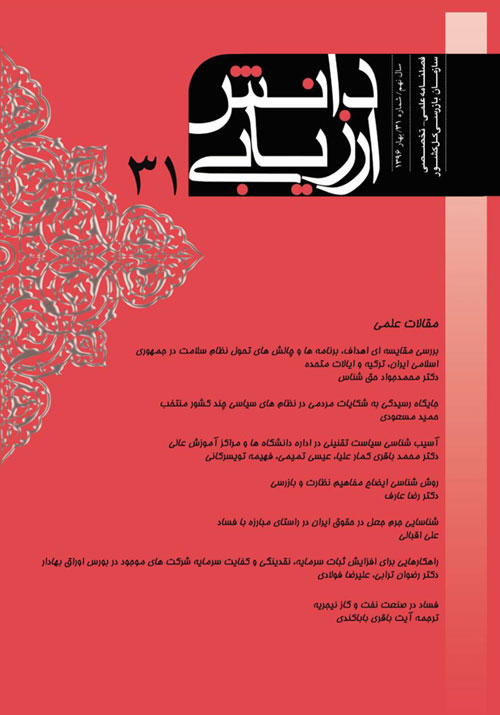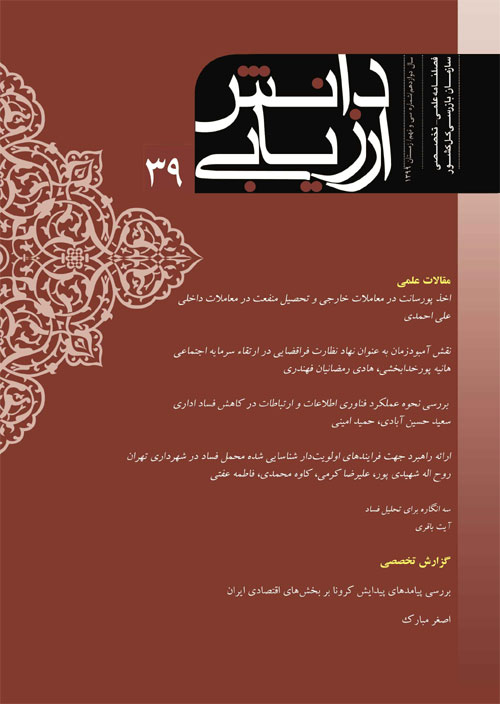فهرست مطالب

فصلنامه دانش ارزیابی
پیاپی 31 (بهار 1396)
- تاریخ انتشار: 1396/03/20
- تعداد عناوین: 7
-
صفحه 155
-
Page 7Achieving an efficient and effective health system, requires designing development programs and proper implementation of them. In recent years, various countries including Iran have defined development programs in this field; Evidence suggests that the success in Health Care depends on several factors, among them is to review the experiences of other countries. This article introduces the Health development program and its challenges in the Islamic Republic of Iran. Then the health development programs in Turkey, as a successful example, and Obama Health Care Insurance as an unsuccessful example have been examined. Findings show that the determination of macro-political management, financial plan, the proper definition of functions and structures, and having vision and integrated plans, play an effective role in the success of health development plan.Keywords: Health Development Plan, Islamic Republic of Iran, Turkey, United States
-
Page 39The main issue of this study is to explain the experience of other countries dealing with complaints. The main objective as well is to investigate the experiences of the worlds most successful countries dealing with complaints and public statements and procedures, processes, administrative structures, laws and regulations in different countries reviewed. The most important method used in this research is a documentary and library-based online search. In this regard, Finland, Australia, the United States, Denmark, Norway, Germany, China, Turkey and Egypt were selected and the status of the complaints process was analyzed. The findings suggest that complaints handlings in these countries are similar in structure and practice in Iran, but they differ in terms of the structure of government as well as the level of handling complaints.Keywords: Complaints handling, inspection, supervision, public complaints, public oversight
-
Page 67
According to the relevant laws, including paragraph (a) of article 49 of the law of the fourth development plan and paragraph (b) of the law of the fifth development plan, and subsequently Article (1) of the law of the permanent development plans of the country, universities and institutes of higher education and research act without observing the laws and regulations governing Government agencies, in particular the General Accounting Law, the Law on State Service Management, and the Law on Bidding, on the basis of the Recruitment, Administrative, Financial, and Trading Regulations and Procedures, approved by the Board of Trustees, approved by the Ministers of Science, Research and Technology and Health, Therapy and Education Medicine. Considering the assumption that the legislator's purpose is to facilitate the decision-making and implementation of current affairs of universities and research centers and the escape of bureaucracy, What is noteworthy is that the limits of authority and decisions of Board of Trustees have apparently not been identified, and they are facing challenges and hardship, among them law- escaping.
Keywords: Board of trustees, university, place of approval, executive body, detailed budget, delegation, strategic plan -
Page 83Scientific research shows that ambiguity in laws and regulations is always expressed as a fundamental factor in the set of causes and of corruption. On this basis, these questions arose: what is the method for removing ambiguity from the concepts contained in the rules and regulations? Is Law among the other human knowledge responsible for resolving the ambiguity of such concepts? The author's claim is that when speaking about ambiguity in the meaning of the words and phrases contained in the text of the rules, language and text matter. And removing the ambiguity of the text has its own linguistic knowledge. The knowledge that can clarify ambiguity among its important examples, the ambiguous concepts of Supervision and Inspection, is the Knowledge of semantics and methods recommended in this knowledge. The author while introducing knowledge and semantic methods tries to show that; How are pbt keywords in the text of the law examined and measured in a semantic field and in a systematic analysis ? The ratio of these keywords is checked within the following topics: other words, context, the derivatives of that word in the text, the meanings of each derivative in its text application, Synonyms of any meaning and finally in relation to concepts that were cited in the text And for any measure, a feature or features for that ambiguous concept is obtained. By summing up these features, the dimensions of that ambiguous concept are identified and clarified.Keywords: Semantic field, Context, Syntagmatic Relation, Paradigmatic Relation, Synchronic, Diachronic
-
Page 109The expansion of daily human affairs, whether financial or non-financial, requires the use of documents. The importance of these documents shows the necessity of regulating and using them without distortion and fraud. On the other hand, the development of business, economic, scientific and political relations among individuals and communities involves the regulation and exchange of numerous documents and the same has always been the case with falsification in documents. There are issues and cases in the penal code before and after the Islamic Revolution of Iran and some other specific laws dealing with this subject. In this article, we have tried to define forgery and use of the fake documents and the introduction of elements constituting crime and examples of its criminal offenses in different laws In terms of criminology.Keywords: Forgery, Material forgery, Virtual forgery, Forged document, Fraud with forged document
-
Page 133Risks exist in all areas among them is the banks that are particularly concerned about with their important role in the economic system. Ownership structure and ownership concentration can affect the types of companys financial risks, such as capital adequacy, liquidity, and capital stability. In this study, the effect of concentration of ownership of banks in Tehran Stock Exchange on risk indicators over the period from 2006 to 2013 has been investigated using panel data method.Keywords: Concentration of ownership, capital adequacy, liquidity, capital stability, bank
-
Page 155This article examines corruption in the oil and gas industry as a consequence of economic growth. The library research method is chosen for this study. The findings indicate that the level of corruption in Nigeria has a significant impact on its economic growth. In this sense, an economy without zero tolerance against corruption cannot grow fast. The study concluded that despite the efforts of ICPC and EFCC, the problem of corruption in the Nigerian economy remains valid. Therefore, recommends that all public property stolen must be carefully examined, the perpetrators should be prosecuted and and pillaged property with the same value at the time were stolen, should be returned.Keywords: Corruption, oil, gas industry, economic growth


